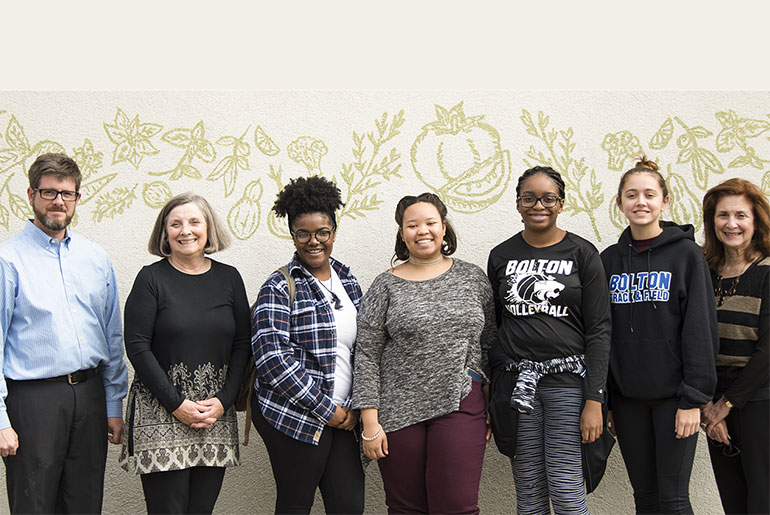The information presented on this page may be dated. It may refer to situations which have changed or people who are no longer affiliated with the university. It is archived as part of Mississippi State University's history.
MSU students design agriculture optional school in Tennessee
Author: Vanessa Beeson

A recent collaboration between Mississippi State University and a Memphis-area high school led to new ideas for a master plan incorporating agriculture for experiential learning. Pictured are, from left, Cory Gallo, MSU associate professor of landscape architecture; Becky Baker, Bolton High School counselor; Bolton High School students, Marissa Bradford, India Montague, Bryanna Fayne and Zoe Simpson; and Linda Sklar, director, Optional Schools and Advanced Academics at Memphis City Schools. (Photo by Dominique Belcher)
Mississippi State University landscape architecture students recently designed and presented campus master plans for a Memphis-area high school.
Seventeen undergraduates and two master's students in the College of Agriculture and Life Sciences landscape architecture major spent the semester reimagining the master plan of Bolton High School in Arlington, Tennessee. Located in a small town just northeast of Memphis, the high school plans to return to its rich agricultural roots as an agriculture optional school. The school district has optional programming, with schools that provide "creative and rigorous coursework and extra-curricular programs" with a "specialized learning focus." For more, visit www.scsk12.org/optional/.
Early in the semester, the high school met with MSU's landscape architecture department for a design charrette, which is an intensive planning session where all stakeholders collaborate on a vision for development. The charrette was sponsored by Michael Hatcher and Associates, a Memphis-based landscape architecture firm. During the event, Bolton High students, teachers and administrators met with the MSU students to brainstorm ideas for the school's future design. From there, the MSU students, as part of a design studio, took the ideas and ran with them.
The designs, which have been presented to Bolton High stakeholders, feature elements that visualize the campus as a hub of agricultural learning. One design featured a tiered system based on grade and skill level with younger students tending gardens closer to school buildings while older students completed more complex tasks in outlying row-crop fields and livestock pastures. Many designs emphasized community involvement by including community sustained agricultural lands, community gardens and farmers markets.
Associate Professor Cory Gallo, and Professor and Department Head Sadik Artunc, co-taught the design studio. Gallo said the experience gave students a chance to tackle a real-world project.
"I think each one of them took a lot of ownership on the project because the length of time they spent on it. They were able to get into the details of the design," Gallo said. "This was a great project for the students as future landscape architects because they had to focus and figure out how to create a viable campus master plan for a school that is very much about community and place."
Bolton High School was an agricultural college and teacher' preparatory school at the turn of the last century. The school returned to those roots in part because of Julency Myrtil, a Bolton High senior. Myrtil applied for and obtained a grant from the Kitchen Community, a national nonprofit that builds Learning Gardens for Memphis-area schools. In addition to getting a Learning Garden at the school, Myrtil garnered grants to build more gardens, restore an onsite greenhouse and help rebuild the school's agricultural program. Myrtil's passion for ag caught on quickly with other students at the school, including Marissa Bradford, who attended the campus master plan presentations at MSU. She said participating in the Learning Garden helped her realize the difference she and her fellow students were making.
"None of this seemed like a big deal to me until we planted seeds in the raised beds. That's when it hit me that we were planting a seed that will impact generations," Bradford said. "Seeing the MSU presentations made me realize what a difference all of this will make for the school now and in the future."
Becky Baker is a counselor for the international bachelorette students at Bolton High, and she spoke about the tenacity of the students in transforming the school.
"These students, many of whom tend our school garden every morning at 6:30 a.m., continue to help develop the vision of Bolton as an agriculture optional school," Baker said. "It's amazing to see how young people have embraced the project. For me, it shows that experiential learning is something the students are very interested in."
The MSU landscape architecture department includes majors in landscape architecture, landscape contracting and management, and a dual degree option that combines both majors. Find out more at www.lalc.msstate.edu.
Date: 2017-12-15




